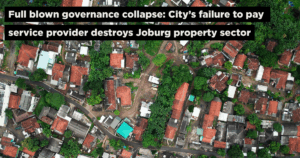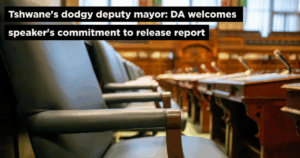With only two months before the start of the 2026 academic year, the Gauteng Department of Infrastructure Development (GDID) cannot show a single project that has been completed and handed over to the Department of Education for this year. Several major school construction projects remain incomplete, despite repeated promises from GDID that all sites would be ready in time and handed over.
While GDID is still trying to streamline processes and deal with underperforming contractors, the department’s own quarter two performance report shows troubling delays across several school projects that are essential for easing overcrowding in classrooms across the province.
Thubelihle Intermediate School in Soweto is only 35% percent complete, while Hoërskool Elsburg in Ekurhuleni stands at less than 50%. Schools intended for learners with special educational needs, such as Bafeti LSEN School in Mabopane, remain far behind schedule, despite being designed to replace outdated and inadequate buildings that no longer meet learners’ needs.
To make matters worse, this department’s performance has regressed by 6% to 67% against the performance from the previous financial year because of poor project management, bad planning, contractors abandoning sites or contractors just not being qualified to do the work. The department continues to rely on recovery plans yet experiences the same problems each quarter without us seeing any improvement.
The Gauteng Infrastructure Financing Agency’s (GIFA) Schools Programme is facing similar challenges. Several schools expected to open in the new year are still awaiting critical approvals, including Site Development Plans and Building Plans, which means construction cannot progress at the pace required. GIFA itself notes that six priority schools are earmarked for completion by the end of the financial year; however, the administrative delays make this increasingly unlikely.
The consequences of these failures are predictable and preventable. Learners may once again be placed in overcrowded classrooms or temporary structures, undermining the quality of education and placing pressure on principals and teachers who are already stretched. Learners with special needs will continue to be taught in unsuitable facilities because the government has failed to deliver on its commitments.
The Democratic Alliance (DA) demands urgent intervention from the Premier and Provincial Treasury to unblock the delays and to ensure that every rand allocated to school infrastructure delivers real value. While MEC Mamabolo poses for photos at his oversight visits with his so-called A-team, none of these media stunts can replace the glaring truth that this department continues to fail Gauteng learners. The provincial government must present a clear and honest readiness plan for the 2026 school year and take responsibility for the continued failures in its infrastructure programmes.
A DA-led Gauteng Provincial Government would ensure that building schools on budget and on time is a priority. Only qualified building contractors would be appointed and held to account. Without these clear guidelines in place, our learners will continue to be at a disadvantage.








